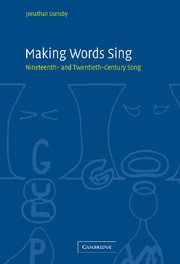Book contents
- Frontmatter
- Contents
- Acknowledgements
- Introduction
- 1 An introduction with no words, with intended words, and untheory
- 2 A love song: Brahms's ‘Von ewiger Liebe’
- 3 Boundless opulence: postscripts on Schoenberg's premonition
- 4 Interlude on peace, laws, flowers, and men flying
- 5 To Amherst via Vienna
- 6 By way of brief conclusion
- Bibliography
- Index
Introduction
Published online by Cambridge University Press: 23 November 2009
- Frontmatter
- Contents
- Acknowledgements
- Introduction
- 1 An introduction with no words, with intended words, and untheory
- 2 A love song: Brahms's ‘Von ewiger Liebe’
- 3 Boundless opulence: postscripts on Schoenberg's premonition
- 4 Interlude on peace, laws, flowers, and men flying
- 5 To Amherst via Vienna
- 6 By way of brief conclusion
- Bibliography
- Index
Summary
The literature on words and music is vast. This was already the case even before the proliferation of writing about Western classical music that was evident in books, journals, encyclopaedias, and more ephemeral sources during the 1980s and 1990s, not only in English, and not only restricted to ‘pure’ studies but also in the realm of intra- and intercultural research. So why is yet another book needed? If it is difficult to pinpoint a conclusive answer to that question, the direction of thought leading to Making Words Sing is clear enough.
Firstly, musicological thinking moves on from one short period to the next as each new wave of writers brings fresh insight and knowledge, and in particular as taste changes. For example, in the specialized field of music analysis – on which I draw throughout these pages intermittently, although without importing too much of its fascinating and necessary jargon and technical routines, or, all being well, its tendency to redescribe the known and even to state the obvious – a sense of the appropriate repertoire has changed beyond recognition in recent years. There was a time, say twenty years ago, when those interested directly or vicariously in music theory and analysis would rightly joke that ‘analysis’ could be defined roughly as: the detailed study of the music of Anton Webern. And if that pleasantry is nowadays wearing very thin, this is a sign of the broadening of technical engagement with music that some would say has led to dilution and lack of focus, but that others welcome as a way forward from the perceived tyrannies of high modernism in its ascetic intellectualism, and of structuralism in its obsession with the apparent mechanisms of art.
- Type
- Chapter
- Information
- Making Words SingNineteenth- and Twentieth-Century Song, pp. 1 - 9Publisher: Cambridge University PressPrint publication year: 2004

